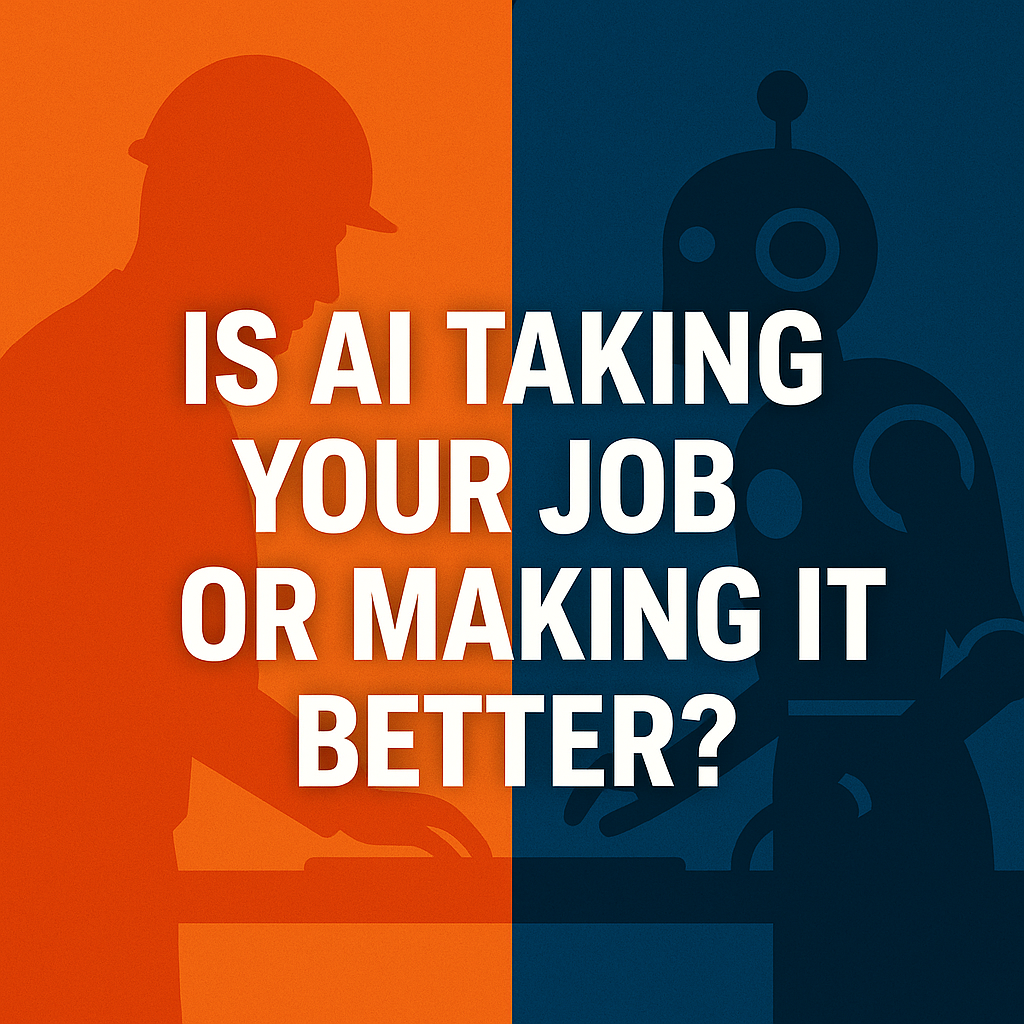The Fear Is Real — But Is It Accurate?
“Will AI take my job?” It’s the question echoing in breakrooms, boardrooms, and social feeds everywhere. As ChatGPT, Midjourney, and Gemini advance, industries from copywriting to customer service are seeing the ground shift.
But the reality isn’t just black or white. The AI revolution isn’t replacing jobs — it’s reshaping them.
In 2025, the winners won’t be AI or humans — but humans who know how to use AI.
🤖 What Jobs Is AI Already Replacing?
Let’s get the tough truth out of the way.
AI is already taking over repetitive, rule-based tasks. Jobs most at risk:
- Data entry clerks
- Transcriptionists
- Basic customer support
- Low-level graphic design
- Entry-level content writing
Generative AI can create emails, design logos, and even generate legal templates faster and cheaper than entry-level professionals. Tools like AutoGPT, Perplexity, and Claude are changing how companies operate.
If your job is highly repeatable, AI is learning how to do it.
🧠 But What Jobs Are Safe — or Even Growing?
AI may be brilliant at automating tasks, but it still struggles with:
- Creativity that breaks the mold
- Emotional intelligence
- Strategic thinking
- Physical dexterity in unpredictable environments
Growing fields in the AI era include:
- AI prompt engineers
- Creative directors & brand storytellers
- Mental health professionals
- Skilled trades (electricians, plumbers)
- UX designers & human-AI interaction experts
- AI ethicists and compliance managers
AI is replacing tasks, not entire jobs. That means workers who evolve will thrive.
⚖️ The Great AI Divide: Who’s Winning and Who’s Losing?
A dangerous divide is growing between workers who can use AI and those who can’t.
Winning right now:
- Tech-savvy freelancers using AI to scale income
- Employees automating workflows with tools like Zapier + ChatGPT
- Agencies offering AI-enhanced creative services
Losing right now:
- Workers without digital skills
- Companies resistant to AI adoption
- Educators not updating curricula
This divide isn’t just technological — it’s economic and educational.
🔍 Real-World Examples: AI in Action
✅ Copywriting:
Companies are now using ChatGPT to generate first drafts — then having human editors refine tone and strategy.
✅ Law:
Legal teams use AI to scan thousands of documents for relevant case law — but final decisions still require human judgment.
✅ Healthcare:
AI can detect cancer in X-rays faster than radiologists — but it can’t explain options to a grieving patient.
AI + human = exponential productivity.
🌐 5 Ways to AI-Proof (and Future-Proof) Your Career
- Learn to Use AI Tools
- ChatGPT, Midjourney, Notion AI, ElevenLabs, etc.
- Knowing the tools gives you leverage, not replacement.
- Develop Un-Automatable Skills
- Communication, strategy, leadership, emotional intelligence
- Start Creating, Not Just Consuming
- Start a side project, blog, or YouTube channel using AI to accelerate growth
- Think Like a Consultant
- AI increases productivity. Companies will pay you to know what to do with that power.
- Invest in Continuous Learning
- Platforms like Coursera, Udemy, and LinkedIn Learning now offer AI-specific micro-degrees
📉 What If You Do Get Replaced? What Then?
It’s a hard truth — some jobs will disappear. But here’s the upside:
Every past technological disruption has created more jobs than it destroyed — eventually.
The shift may be painful, but it opens doors to:
- Starting your own business with AI tools
- Pivoting into digital work
- Upskilling into the next wave of roles
The worst thing to do is freeze. The best thing? Adapt.
🧠 Human Relevance in the Age of AI
In this AI arms race, your uniquely human traits are your advantage:
- Empathy: AI can sound caring, but it doesn’t actually care.
- Ethics: AI lacks moral intuition.
- Originality: AI reconfigures — it doesn’t invent from nothing.
- Storytelling: Humans still connect with authentic stories, not perfect algorithms.
🏁 Final Thought: AI Isn’t the Threat — Inaction Is
AI won’t replace you.
But someone using AI better than you might.
In 2025 and beyond, the real competition is not humans vs. AI — it’s humans augmented by AI vs. humans ignoring it.
The good news? You can choose which human you want to be.
